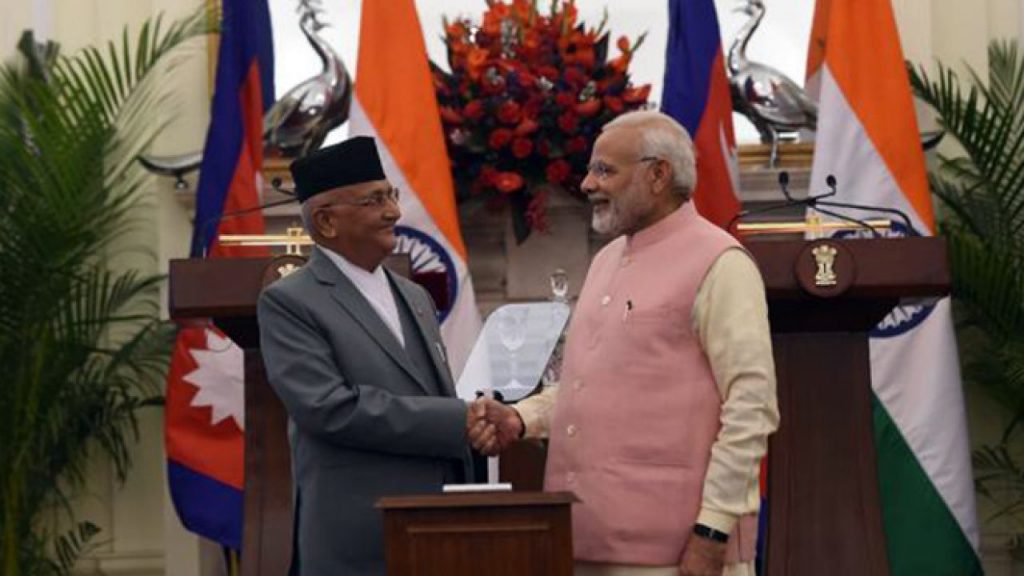Manas Dasgupta
NEW DELHI, Jan 6: Nepal has shown preference to Indian vaccines over the one offered by China to fight against the Corona pandemic.
One of the major task before the Nepal foreign minister in the present K P Sharma Oli caretaker government Pradeep Gyawali when he visits India later this month would be to finalise a deal for the supply of Covid-19 vaccines to Nepal.
According to official sources, Gyawali will land in New Delhi on January 14 to attend the sixth Nepal-India Joint Commission meeting with external affairs minister S Jaishankar that will begin the next day. But during the visit, he has been tasked to get a clear commitment from India for supply of over 12 million doses of the coronavirus vaccines produced in India.
The Nepal government sources said Nepal had offers from China to supply its version of the Sinovac vaccine, but the Oil government had preferred to get Nepal’s vaccine supply from India rather than China.
Nepal’s ambassador to India Nilamber Acharya has already held several rounds of meetings with Indian vaccine manufacturers and government officials. His last meeting was on Tuesday with Dr V Krishna Mohan, executive director of Bharat Biotech that is producing the indigenously-developed “Covaxin” which has already been granted emergency use authorization by the Drug Controller General of India.
Amidst soured relations between the two neighbours when Kathmandu issued a new political map, which it claimed was in retaliation of India declaring some of its territory as India’s own, Nepal’s preference for Indian vaccines was considered in the official circles as a positive move towards improving India’s relations with the Himalayan country.
Pradeep Gyawali is expected to take up the boundary dispute during his discussions with Jaishankar and officials in Kathmandu and New Delhi are giving final touches to the agreements the two countries are likely to reach. One of the agreements being drafted by Nepal was on the health sector over India’s continuous help to the neighbour to fight against Coronavirus.
Nepal’s relations with China, which has poured millions of dollars into Nepal in recent years in the form of aid and infrastructure investment, seems to have taken a new low after its efforts to pressure Oli to accept all the alternatives including quitting the office to avoid a split in the ruling Nepal Communist Party. The Oli government refusing to accept China’s overtures, decided to take the extreme step of dissolving Parliament two years ahead of the schedule and go for fresh elections to be held on Aril 30 and May 10.
Oli later told his countrymen in a televised address that he was forced to take the step because of his rivals within the ruling Nepal Communist Party (NCP) had paralysed decision-making leaving him with no other option. His reference was to the continuing power tussle with Pushpa Kamal Dahal aka Prachanda, the former prime minister who was also the co-chair of the party and had played a lead role along with another prime minister, Madhav Nepal, to force Oli’s exit.
Apparently having exhausted its influence over Oli in recent months, Beijing is lately seen to be leaning in support of the rival communist party faction led by Prachanda and Madhav Nepal.
India also scored a plus point with Nepal vis-à-vis China by underlining that it has adopted a hands-off approach to the political developments in Nepal, calling Oli’s decision to dissolve the 275-member House of Representatives an internal matter of Nepal while China covertly and overtly kept indulging into its political affairs and send delegations to meet the Communist leaders of both the factions but without much success till date.
India’s decision to go ahead with Gyawali’s visit – it was initially scheduled to take place last month – is seen to demonstrate India’s explicit support for the Nepali people and the ruling Oli government.
This visit will reboot ties, an Indian official said, stressing that the two countries shared a unique relationship of centuries-old civilizational ties based on shared geography, history, culture, language and religion.
India is also looking to revive the religious and cultural heritage of Nepal given the civilizational ties between the two countries and could propose help to promote infrastructure development around sites that hold a potential from this perspective.
It was a point that was underscored by Prime Minister Narendra Modi when he last visited Nepal in 2018, starting the visit from Janakpur and launching the Ramayana Circuit by flagging off a bus route between Janakpur and Ayodhya. Modi had then announced a Rs 100-crore package to develop the holy city of Janakpur.

